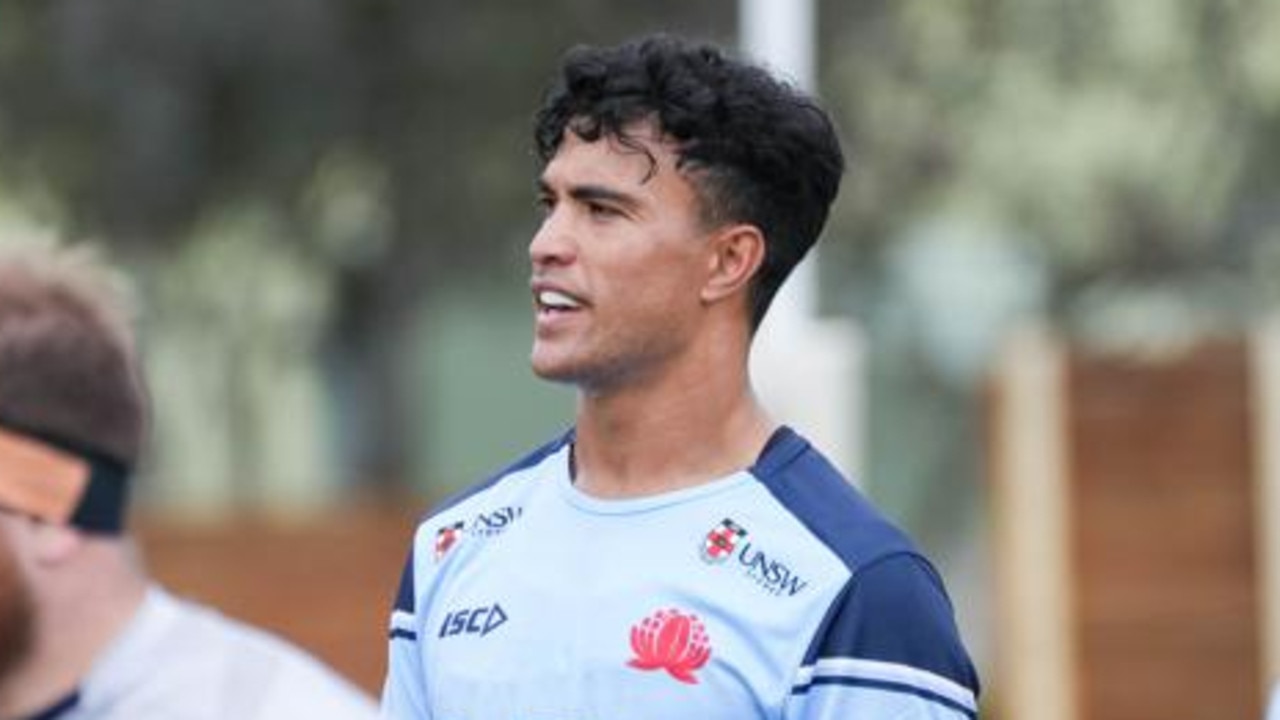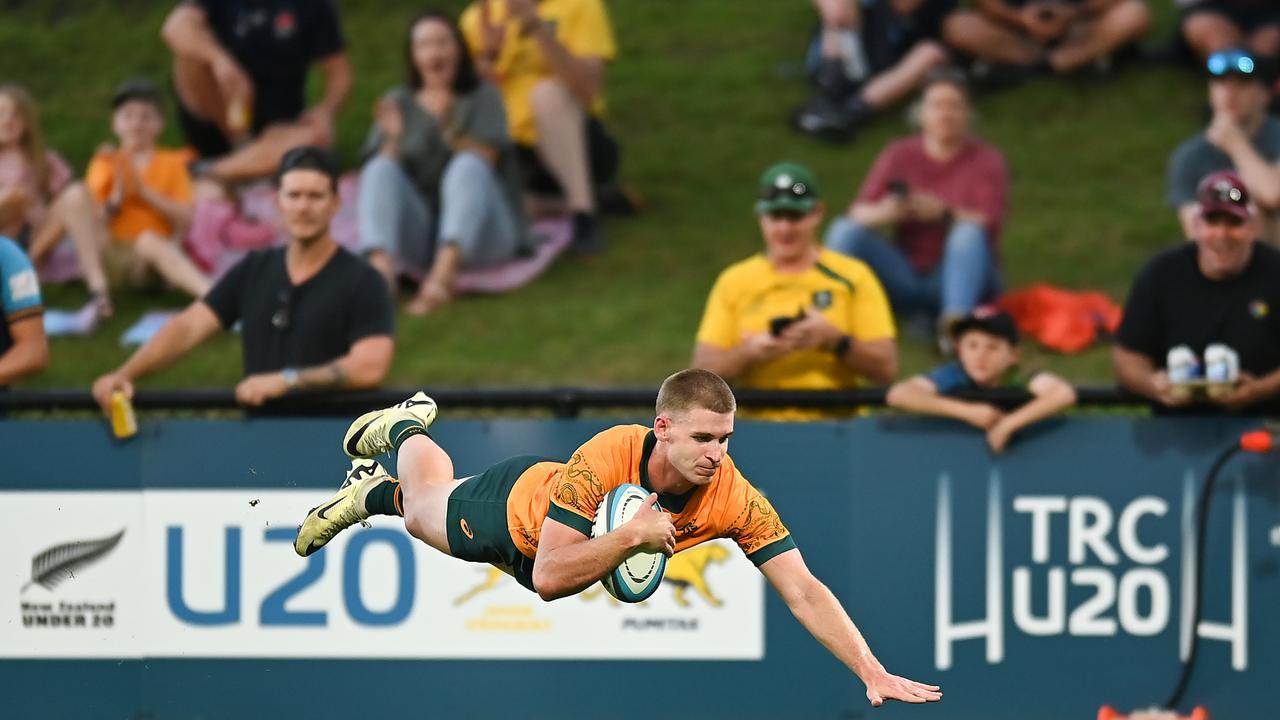Waratahs powerless to keep Kane Douglas as ARU’s new system doesn’t allow them to pay any extra
THE ARU’s new contracting system has rendered the Waratahs powerless to offer Kane Douglas more money to stay in Australia.
Waratahs
Don't miss out on the headlines from Waratahs. Followed categories will be added to My News.
THE ARU’s new contracting system has rendered the Waratahs powerless to offer Kane Douglas more money to stay in Australia.
Wallaby lock Douglas is on the verge of signing a two-year deal with Leinster, whose offer is believed to guarantee about $200,000 more to the 24-year-old than the ARU’s deal.
The ARU has just overhauled their contracting process so that they alone negotiate the salaries of its top 30-odd players, and then have the player’s chosen Super Rugby franchise pay a percentage of it.
The new system means that the Waratahs cannot offer Douglas any more than the determined sum, even though they want to give him extra cash to keep him at NSW.
It’s understood that the ARU’s offer to Douglas is similar to Leinster’s when Test match fees are considered, but those payments would not be forthcoming if he misses internationals due to injury or non-selection.
On top of his base ARU salary, Douglas could earn $140,000 in Test match payments if he plays all 13 Tests and the match against the Barbarians this year, and roughly $100,000 in the World Cup-shortened 2015 Test program.
The ARU, struggling with finances, wants its best players to back themselves to play regular Test rugby.
But any misfortune would rob Douglas of those hefty sums, while Leinster’s contract guarantees full payment regardless of injury or loss of form.
The new ARU system is a simplified model that eradicates the messy situation where stars agree to Super Rugby deals but take an age to finalise their national contracts – like Quade Cooper’s scenario in 2012 when he nearly walked out on Australian rugby despite already signing for Queensland.
However, this new contracting system means Super Rugby franchises cannot compete with overseas raiders if the ARU values the player’s worth less than what the franchise does.
It also means they can no longer offer more to players from rival Australian teams, and must lure them with the promise of a better rugby program.
The ARU’s player contracting manager, Andrew James, said: “We’re confident this model will keep our best rugby talent in Australia and playing for the Wallabies.
“Effectively, we’ve simplified the model so that nationally contracted players only deal with one party during the negotiation process as opposed to the previous model where a player would negotiate with both the ARU and a Super Rugby province for the overall contract value.
“As part of the new model there will be no changes to the remuneration that the players are entitled to receive under the Collective Bargaining Agreement [29 per cent of player generated revenue].”
Waratahs captain Dave Dennis said while he would love the 14-Test workhorse Douglas to stay, he is not confident.
“I think he’s in a position where he’s obviously happy with what’s been offered overseas and not getting much else from the ARU,” Dennis said.
“I’m expecting him to leave, but hopefully he stays around and it can be sorted out.
“That’s just the climate at the moment.
“Kane is a young guy, 24, maybe he wants to go away for a few years and come back.
“He’s got every right to make his own decision.”
Dennis added that a dearth of quality second rowers in Australia could lead the Waratahs to seek a foreign replacement if Douglas departs.
“It’s probably area that would be hard to replace, locks, there’s not a lot of them going around,” Dennis said.
“You look at the depths of locks in the country, there’s probably not a lot.
“You’d like to think you could bring it from within Australia, again it comes back to performance. If there’s a lock that’s going to contribute to the game offshore then you’d probably look for him.
“This is all hypothetical, but if Kane goes, it will be a big loss.”
But Dennis backed the ARU’s stance of not selecting overseas-based Australian players in the Wallabies team, and revealed he has previously rejected the lure of the mighty Euro to pursue his Test ambitions.
“Some guys will stay here purely for the passion of wearing the Wallaby jersey or their club jersey, that’s been a motivation for me in the past around contract time,” Dennis said.
“I can understand guys going, in France there is a new broadcasting deal that is going to go ahead which is going to pump a lot more money into the game.
“The reality is, it’s only human nature to try to achieve as much as you can in the game, in the short period you’ve got in it.
“If someone goes for a bit more money it’s totally understandable.
“And everyone is well aware of the current environment at the ARU, where there are limited opportunities for top-ups, whereas 10 years ago it seemed everyone was getting one and blokes were hanging around.
“It’s just not there anymore, that’s the way it is.”
ARU contracts
The new model:
Wallabies players negotiate their contract solely with the ARU, who decide a player’s value, then have a Super Rugby franchise pay a pre-determined percentage of the wage.
The old model:
Wallabies players negotiate their contract with Super Rugby franchises, and once a figure is reached, they negotiate a top-up deal with the ARU.
What it means:
-Australian Super Rugby franchises cannot pay a player more than a figure determined by the ARU.
-Rival Australian teams cannot offer a Wallaby more money to leave his Super Rugby club, and can only lure him with the offer of a better rugby program.
-The 30-odd nationally contracted Wallabies choose which Super Rugby side they want to play for after finalising their ARU contract.
Australian Super Rugby salary cap:
$4.5 million per season on 30 players in core squad.
Each team is allowed to pay up to a total of $500,000 a year in third party payments which is not included in cap, but these payments also cannot increase the ARU’s agreed salary of a player.


